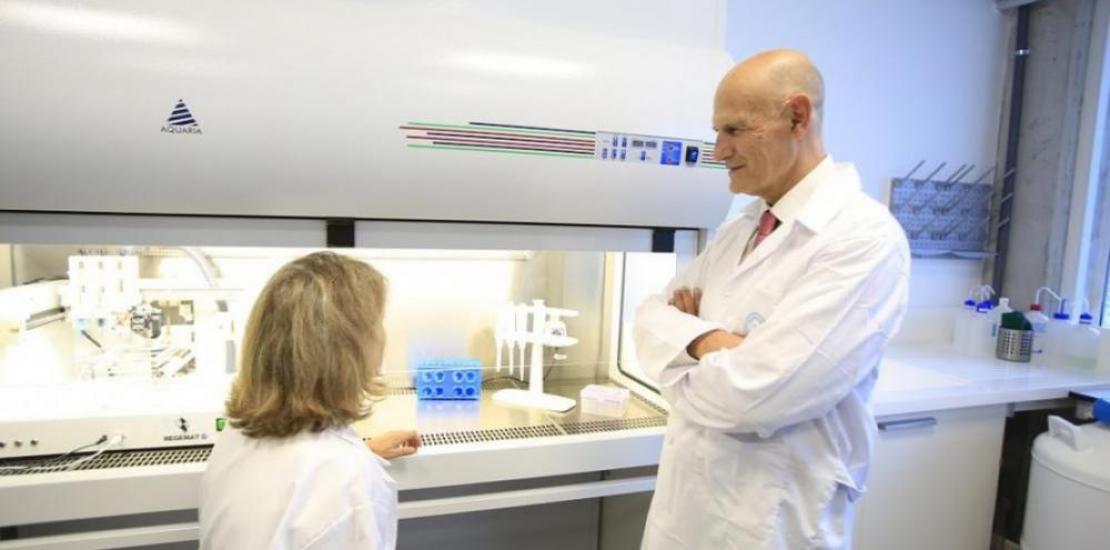Izpisua has managed to safely reverse the signs of ageing in mice using cellular rejuvenation therapy
Using cellular reprogramming, the team of researchers led by the UCAM Professor of Developmental Biology has managed to rejuvenate mice without generating tumours or any other health related problems. The study is published in the scientific journal Nature Aging
Age could simply become a number and not be associated with undesirable effects such as bone fragility, muscle weakness or a greater risk of suffering from cardiovascular diseases or cancer. A team of scientists led by Dr. Izpisua Belmonte has demonstrated, in research promoted and funded by UCAM, that ageing can be reversed safely and effectively in both elderly and middle-aged mice by partially reprogramming their cells to more youthful stages.
"Our results show that we can use this method to delay ageing in animals that have naturally aged. The technique is safe and effective in mice," says Juan Carlos Izpisua Belmonte, Professor of Developmental Biology at UCAM and professor in the Gene Expression Laboratory at the Salk Institute, in California. "In addition to allowing us to address age-related diseases, this approach provides the biomedical community with a new tool to restore health to ageing tissues and the organism itself, improving the functioning of cells in different pathological situations, such as neurodegenerative diseases, musculoskeletal diseases, skin diseases or kidney diseases".
As organisms age, it is not only their external appearance and health that changes; every cell in the body has a molecular clock that keeps track of the passage of time. Isolated cells from older individuals have epigenetic marks in their DNA, due to lifestyle and interaction with the environment, that are different from those in younger individuals. Treating the aged cells with a mixture of four cellular reprogramming factors (Oct4, Sox2, Klf4 and cMyc), also known as 'Yamanaka factors', can erase these epigenetic marks which have accumulated over time, so that the adult cells can be converted into stem cells, from a developmental point of view.
"In 2016, when this project was initiated by Dr Izpisua Belmonte we first published that by using Yamanaka factors we could reverse ageing and increase the lifespan of mice suffering from progeria (a disease that causes premature ageing). Subsequently, in 2021, in a project developed in collaboration with the Spanish Olympic Committee, we published that, even in young mice, Yamanaka factors can accelerate muscle regeneration; and based on these publications, other scientific teams have managed to improve the function of other tissues such as the heart, brain and optic nerve," says Estrella Núñez, co-author of the study and vice-rector of Research of UCAM.
The study and its conclusions
In this study, which has now been published in the journal Nature Aging, Dr Izpisua and his collaborators have applied this same rejuvenation technology to healthy animals that age naturally (over time). One group of mice received regular doses of Yamanaka's factors from 15 to 22 months of age, roughly equivalent to 50 to 70 human years; a second group was treated from 12 to 22 months, 35 to 70 human years; and a third group was treated for only one month at 25 months of age, 80 human years. "What we wanted to test was whether the application of Yamanaka factors over a longer period of time is safe and does not cause tumour formation," says Pradeep Reddy, co-first author of the new paper. No negative effects on health, behaviour or body weight were observed in the treated animals, compared to the control (untreated) group. There were also no blood cell alterations, neurological changes or cancer in any of the treated animals.
When the researchers analysed the signs of ageing in the treated animals, they found that in many ways they resembled young animals. The epigenetic patterns in the kidney and skin cells of the treated animals were very similar to those of the younger animals. They observed that when skin cells of treated animals were injured, they were more proliferative and less likely to form permanent scars than those of untreated animals. This rejuvenation was observed in animals treated for seven or ten months with Yamanaka's factors (groups one and two), but not in those treated for just one month (group three). "When the animals were tested mid-treatment, the effects were not yet as evident. This suggests that the treatment does not simply stop ageing, but actively reverses it, although more research is needed to differentiate the two," says Reddy.
The research team is currently planning new projects to look at how treatment with Yamanaka factors affects specific molecules and genes in the long term and are also developing new ways in which to administer these factors.
"We want to restore full functionality and resilience to cells that have aged or lost their function to make them more resistant to stress, injury and disease," says Dr Izpisua Belmonte. "Our results show that, at least in mice, there is a way to achieve this."
Other authors of the paper are: Mako Yamamoto, Isabel Guillen Guillen, Sanjeeb Sahu, Chao Wang, Yosu Luque, Javier Prieto, Lei Shi, Kensaku Shojima, Tomoaki Hishida and Concepcion Rodriguez Esteban of Salk; Kristen Browder, Zijuan Lai, Qingling Li, Feroza Choudhury, Weng Wong, Yuxin Liang, Dewakar Sangaraju, Wendy Sandoval, Michal Pawlak, Jason Vander Heiden and Heinrich Jasper de Genentech, Inc.; Amin Haghani y Steve Horvath of UCLA; Estrella Núñez Delicado, of the Universidad Católica San Antonio de Murcia; and Pedro Guillen García of the Clinic CEMTRO.
The study was funded by the Universidad Católica San Antonio de Murcia (UCAM) and the Dr. Pedro Guillén Foundation.




